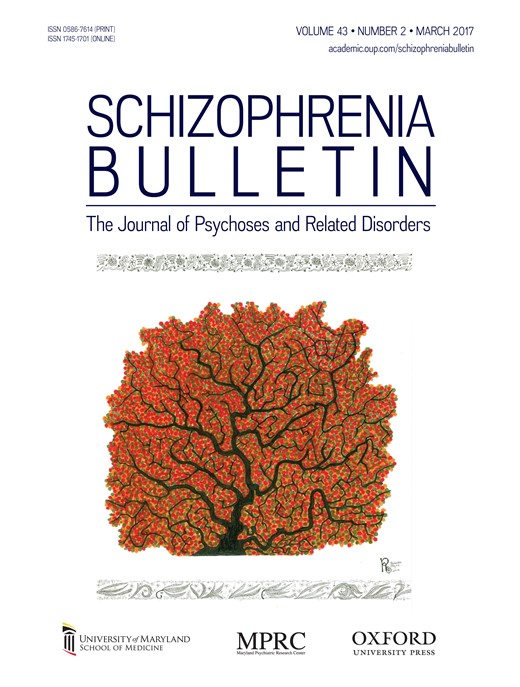-
PDF
- Split View
-
Views
-
Cite
Cite
Dilip V. Jeste, Barton W. Palmer, Elyn R. Saks, Why We Need Positive Psychiatry for Schizophrenia and Other Psychotic Disorders, Schizophrenia Bulletin, Volume 43, Issue 2, 1 March 2017, Pages 227–229, https://doi.org/10.1093/schbul/sbw184
Close - Share Icon Share
The traditional and still common perspective of schizophrenia is that this is an intractable illness with a dismal prognosis. Kraepelin proposed dementia praecox as a disease with poor prognosis as a cardinal feature. Schizophrenia has been likened to a cancer of the mind. That negative view persisted well into the late 20th century despite growing empirical evidence, especially from Europe, that this syndrome was associated with heterogeneity in course, including a favorable outcome in many persons. The bias was so ingrained that in the International Pilot Study of Schizophrenia, initiated in 1968, only the Washington center used developmental, prognostic, and follow-up outcome scales with multiple dimensions to capture the heterogeneity of course of illness; it demonstrated that the outcome was mainly predicted by developmental factors rather than by psychotic symptoms. A 1988 issue of Schizophrenia Bulletin (14:4) that contained reviews of several long-term follow-up investigations from Europe and North America, illustrated a wide range of courses including good outcomes. In a study in Vermont, Harding and colleagues2 followed a longitudinal cohort of individuals with schizophrenia for decades after initial hospitalization and found that one-half to two-thirds of them had substantial improvement. Our own studies have confirmed a long-term trend for improvement in psychosocial functioning, with reduced psychotic symptoms and fewer psychotic relapses that required hospitalization. Despite accelerated physical aging, with high rates of medical comorbidity and premature mortality, a sizable proportion of people with schizophrenia experience extended periods of psychosocial remission associated with resilience, optimism, and social support. Healthy survivor bias is not the primary explanation. In a recent qualitative study, 20 occupationally high-achieving individuals with schizophrenia identified eight categories of coping strategies that they found useful for managing symptoms and supporting recovery: utilizing supportive others, taking medications, enacting cognitive strategies, using avoidance behaviors, controlling the environment, engaging spirituality, focusing on well-being, and being employed or continuing education.3
This type of optimistic perspective about serious mental illnesses (SMI), combined with the inspiring Positive Psychology movement pioneered by Seligman, led us to propose the concept of Positive Psychiatry.4 Positive Psychiatry is the science and practice of psychiatry that focuses on study and promotion of mental health and well-being through enhancement of positive psychosocial factors relevant to mental and physical health as well as illnesses. The key positive psychosocial factors include resilience, optimism, hope, wisdom, post-traumatic growth, and social engagement. As psychiatry is a branch of medicine, there is also a major focus on the biological substrates of positive traits, including neurocircuitry, genetic underpinnings, and biomarkers that may inform researchers and clinicians about the biology of positive mental health. Ultimately, elucidation of the biopsychosocial substrates of positive psychosocial factors may open up new avenues for interventions to promote well-being among people with SMI.
The United Nations formally recognized pursuit of happiness as a fundamental human goal, but there has been little attention to the experience of happiness among people with SMI. Recently Edmonds et al5 reported that, while the mean self-reported levels of happiness, resilience, and optimism among people with schizophrenia were lower than those in healthy comparison subjects, there was considerable within-group heterogeneity; about a third of the individuals with schizophrenia had levels similar to those in their healthy counterparts. Notably, happiness scores in the schizophrenia group were associated, not with severity of psychopathology, but with levels of resilience, optimism, and personal mastery, and (lower) perceived stress. Higher scores on a composite of the positive factors were correlated with better mental and physical health, and importantly, with “healthier” levels of biomarkers of inflammation and insulin resistance. Causal relationships cannot be determined given the cross-sectional nature of the analyses, but these findings raise a question of whether promotion of Positive Psychiatry constructs such as resilience and optimism may have beneficial biological effects.
Positive Psychiatry, including its application to schizophrenia, has limitations—schizophrenia remains a profound challenge to those afflicted with it, their families, and friends. Positive Psychiatry as an empirically grounded basis for evidence-based practice is still in its infancy. Major funding agencies have been focused on the traditional psychopathology model of psychiatry, neglecting the development and testing of interventions grounded in positive mental health. This situation needs to change.
Positive psychological interventions (PPIs)—activities designed to promote positive outcomes via positive processes—have demonstrated feasibility and utility in treating depression.6 In recent years, PPIs have been adapted to and tested in new clinical populations, including schizophrenia. Treatments for schizophrenia typically are designed to target positive symptoms and relapse prevention while primary negative symptoms, impaired cognition, and many aspects of social impairment remain unmet therapeutic needs. Persons with schizophrenia benefit most from concrete, skill-based strategies that are a component of PPIs. PPIs also directly target factors such as meaning and purpose, which are rarely addressed by existing psychosocial interventions, but are potentially helpful in maintaining recovery by helping patients to establish meaningful connections with people and activities. Meyer et al7 conducted a pilot study of a PPI called Positive Living, in 16 outpatients with schizophrenia. Their intervention included elements designed to address common cognitive impairments associated with schizophrenia, such as (a) asking participants to report on an ongoing positive goal in each session, (b) beginning and ending every session with a brief mindfulness exercise (“mindfulness minute”), and (c) creating worksheets for each positive psychology exercise. (The mindfulness component was included because prior studies had shown mindfulness helpful in managing psychotic symptoms during therapy sessions by helping clients to focus on the present moment during therapy.) Participants reported significant improvements in well-being, savoring, hope/confidence, goal orientation, and psychotic and other psychological symptoms postintervention and 3 months later.
Using PPIs in conjunction with traditional psychosocial treatments such as cognitive-behavior therapy, social skills training, or psychoeducation may enhance an individual’s progress toward recovery. There is also a need for developing and testing wellness-based interventions in schizophrenia, such as walking, weight management, Yoga, social environment building, mindfulness meditation, and resilience enhancement. In various other groups, such interventions have also been shown to improve brain function. Studies of treatments that include PPIs as part of broader individual therapy are necessary to help determine how best to use PPIs to promote psychological recovery in individuals with schizophrenia and related disorders.
In conclusion, Positive Psychiatry for SMI is not an oxymoron, but rather a much needed new perspective and approach to fully addressing the toll of these disorders in terms of suffering and reduced well-being. Happiness is possible even in the context of a life challenged by schizophrenia. Resilience, optimism, hope, wisdom, social support, and other positive factors represent key constructs in Positive Psychiatry that have relevance to helping people with SMI. A positive change in attitude toward SMI is necessary among scientists and clinicians, in order to effect a similar change among people with SMI and their families. As the application of Positive Psychiatry to schizophrenia research and clinical care is in an early phase, due caution is warranted, but efforts to develop and test novel positive psychosocial and biological interventions for schizophrenia are urgently needed. Appropriately optimistic therapists help foster parallel optimism in patients and their families. It is important for the field to appreciate that therapeutics need not be restricted to addressing psychopathology, and that compensatory, lifestyle-focused, and resiliency pathways provide therapeutic targets that may positively impact neurobiology and enhance personal fulfillment. Last but not least, Positive Psychiatry provides a more humanistic approach that avoids reductionism.
Funding
National Institute of Mental Health (NIMH) (5R01 MH094151-04 to D.V.J.) and UC San Diego Stein Institute for Research on Aging
Acknowledgment
The authors have declared that there are no conflicts of interest in relation to the subject of this report.
References
Author notes
*To whom correspondence should be addressed; tel: 858-534-4020, fax: 858-534-5475, e-mail: djeste@ucsd.edu




